Tristan training after flax removal project
Report and photographs from Carmen Ferreira
With thanks to Tristan Government Environmental and Policy Officer Stephanie Martin
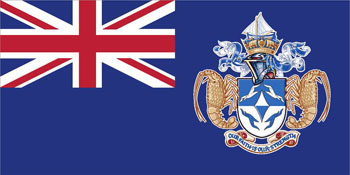 |
 |
The Tristan da Cunha Government, through its Conservation Department, with the assistance of RSPB has secured funding for wildlife and conservation programmes on Tristan and surrounding islands. The multi-year project to clear invasive New Zealand flax plants from Inaccessible Island is one such partnership programme.
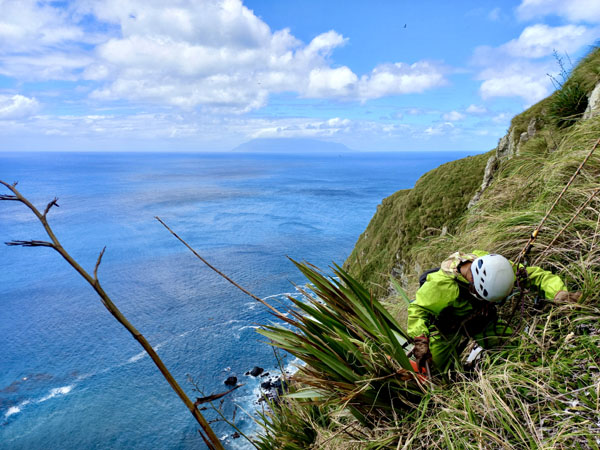
Two views taken on 15th January 2022 of roped climbs by the team on the cliff at the Waterfall to remove invasive New Zealand flax plants recognisable visible here by their sword-like waxy leaves and (in the upper photo) by the seed-head.
In the lower photo can be seen a sooty albatross chick on its pedestal nest. One of three albatross species that breed on Inaccessible Island, the sooties favour exposed cliff sites to breed.
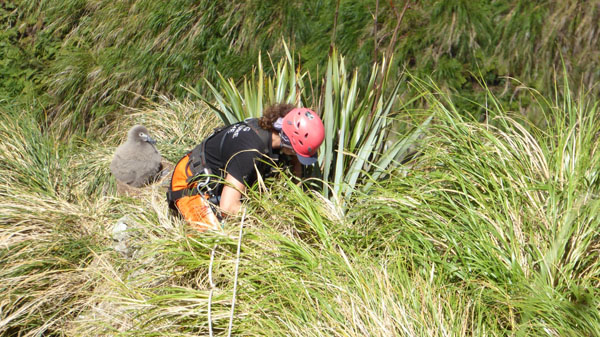
Involvement of local resources
The Tristan da Cunha Conservation Department under the leadership of Trevor Glass plays a key role in the flax eradication programme. Conservation Department team members Julian Repetto, Wayne Swain and Christiaan Gerber (who was part of the flax removal team for the 2020/21 and 2021/22 field seasons as a Level 1 Rope Access Technician) play a vital role in logistical support during each flax clearing season on Inaccessible. Trevor and his team have been on standby as a first line of local support to the flax team through e.g., daily radio check-ins, have successfully completed two re-supply trips to Inaccessible and managed to safely transfer and extract the flax team and their extensive expedition cargo to and from Inaccessible Island. The conservation team’s hands-on and practical contributions to the project have proven to be a crucial element to the flax removal programme.
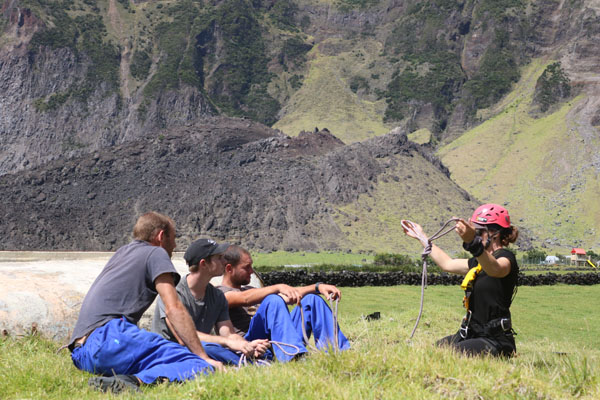
Members of the Tristan Conservation Department receive training in rope handling and climbing as show in these two photographs taken on 15th March 2022.
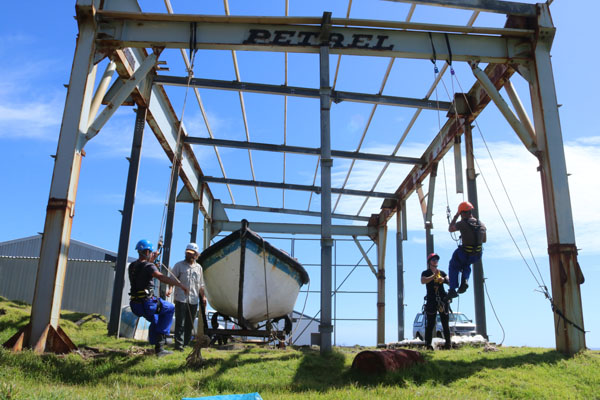
Raising awareness and building capacity within the local population
The present cycle of the flax eradication programme, funded by BEST / EU financial contributions under the stewardship of the European Commission’s department of International Partnerships, makes provisions to raise awareness and build capacity among Tristanians to build towards a sustainable long-term strategy for managing the invasive flax plants on the group of surrounding islands.
As a first capacity-building outcome upon its post-field season return to Tristan da Cunha, the flax team presented a basic rope work training session to members of the Tristan Conservation Department under the leadership and watchful eye of I-Rigging Solutions’ experienced IRATA Level 3 Rope Access Supervisor Carmen Ferreira. The session focused on introducing some of central components of flax eradication work, namely the technical rope skills of safely and correctly descending and ascending ropes, rope-based lifting- and lowering systems, knot work and rope access equipment familiarization. Future visits of the flax eradication team will see these initial skills being cemented within the Tristan Conservation Department in a controlled, supervised, and safe fashion.
In terms of raising awareness in relation to flax as an invasive species as well as the management thereof, a short visual presentation was delivered at St Mary’s school to introduce the children to the concept of biodiversity and provide a little insight into the work the flax eradication team has been doing on Inaccessible Island, as well as provide an idea of the team’s camp lives during the field season. The aim is to hold follow-on sessions, undertaken or coordinated by the flax removal team in conjunction with educators and the Tristan Conservation Department. Such sessions would include practical show-and-tell sessions for the children, but also involve the development of a practical lesson plan including elementary rope skills and field navigation training sessions in order to spark interest among the children and so strengthen initiatives to protect the pristine and unique diversity of Tristan da Cunha and its surrounding islands.
Carmen Ferreira,
I-Rigging Solutions Flax eradication team lead,
BEST technical project lead, IRATA Level 3 Rope Access Supervisor

